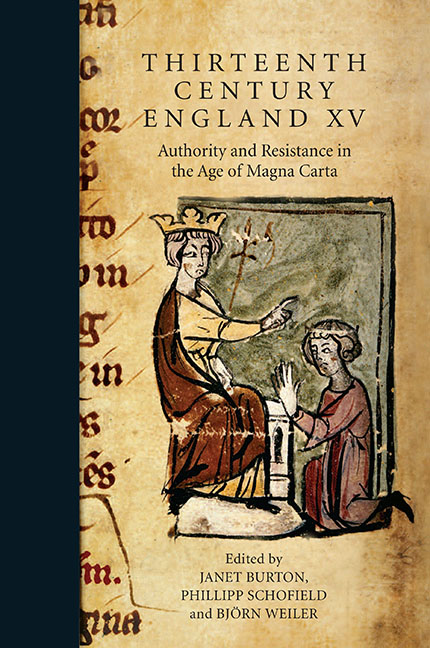 Thirteenth Century England XV
Thirteenth Century England XV Bad Sheriffs, Custodial Sheriffs and Control of the Counties
Published online by Cambridge University Press: 11 June 2021
Summary
Mabel Mills, the pioneer of studies of government finance in the thirteenth century, was the first to draw attention to the particule proficui, the particulars of account produced by custodial sheriffs, and to the Exchequer reforms of the late 1230s. In these reforms, the royal demesne was taken out of the sheriffs’ hands and managed separately. Most of the counties were committed to custodial sheriffs rather than farmers. These custodians delivered particulars, reporting how much could be produced from the remaining county revenues. Miss Mills wrote about the reforms in the years up to 1242. This paper looks at what happened next, as the counties were farmed out again and subjected to increasing financial pressure. This contributed to the discontent which made itself heard in 1258 at the outbreak of the baronial reform movement. The reformers conducted another experiment with custodial sheriffs, in 1258 and 1264. These custodians also produced particulars, which provide an unusually detailed insight into the administration of the counties.
There were two contrasting approaches to the management of county finances. Usually the sheriffs were appointed as farmers: each one was given a set target for the amount of cash he was expected to produce; more importantly, from his point of view, he could keep anything he collected over and above this fixed amount and he did not have to provide any information as to the source of this revenue. The alternative was for the Exchequer to appoint custodial sheriffs. These custodians accounted in the pipe rolls ut custos: each sheriff was expected to collect the revenues of his county and deliver the full amount to the Exchequer; he also had to provide a detailed breakdown of the sources of this cash, the particulars; the sheriff's reward was, in principle, a fixed amount. Following the custodial experiment of the late 1230s, the particulars were presumably used by the Exchequer to determine how large a fixed profit target might be reasonable for each county when farming resumed.
Figure 1 provides a rough guide to the overall trend of county finance, starting in 1240, just before the return of farmer sheriffs. It uses the figures for the sheriffs’ adventus – another topic first studied by Miss Mills. At Easter and Michaelmas of each year, the sheriffs of all the counties were supposed to come to the Exchequer to pay in the cash they had collected.
- Type
- Chapter
- Information
- Thirteenth Century England XVAuthority and Resistance in the Age of Magna Carta. Proceedings of the Aberystwyth and Lampeter Conference, 2013, pp. 35 - 50Publisher: Boydell & BrewerPrint publication year: 2015
